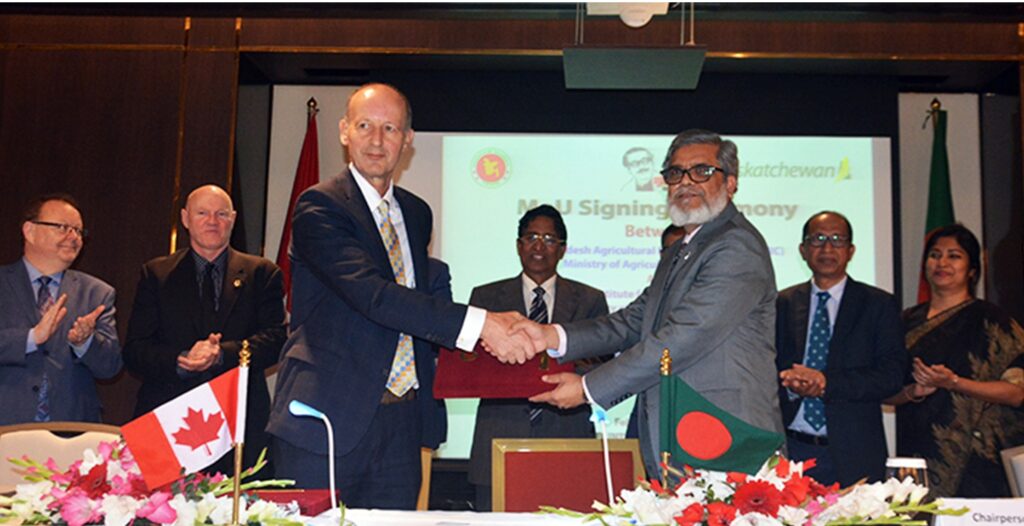Canada and Saskatchewan’s strength in agriculture research and development now has an expanded footprint in the People’s Republic of Bangladesh, as the Global Institute for Food Security (GIFS) at the University of Saskatchewan (USask) has announced a new international office in the South Asian country, as well as a new Research Chair in Food Security.
The Global Institute for Food Security Regional Office in Bangladesh, inaugurated on December 12, will support GIFS’ multidisciplinary research, training and development partnership with the Bangladesh Agricultural Research Council (BARC) of its Ministry of Agriculture, designed to help promote sustainable food security in the country.
Resident at GIFS, the newly created Bangabandhu Research Chair in Food Security has been awarded to Andrew Sharpe (PhD), GIFS’ director of genomics and bioinformatics. Named in honour of Bangladesh’s first President and Prime Minister Sheikh Mujibur Rahman, the Chair will lead vital agriculture research and development activities between Saskatchewan and Bangladesh, to establish the goals of the partnership.
“Research and innovation have driven Canada and Saskatchewan’s agriculture success, and our partnership with BARC will deliver joint programs to help enhance farmer incomes, address the effects of climate change and strengthen the country’s delivery of the United Nations Sustainable Development Goals, including around reducing hunger and empowering women,” said GIFS Director of Strategic Partnerships and Chief Operating Officer Stephen Visscher CBE.
“GIFS’ international office and the Bangabandhu Research Chair in Food Security will provide us on-the-ground presence in Bangladesh and will be strategic vehicles through which we can implement targeted programs in the country, serving as a template to tackle similar challenges where they may occur in different regions of the world.”
Saskatchewan is a leading agri-food exporter in Canada and Bangladesh is one of the province’s top 10 markets, with 2020 exports to the country alone valued at $612.9 million. Bangladesh is also emerging as a trade and investment destination with pro-business and pro-investment policies, vast interconnectedness within the South East Asia region, growing exports, expanding infrastructure and strong domestic demand.
“Saskatchewan and the People’s Republic of Bangladesh continue to enjoy strong bilateral relations, and agriculture is important to both our economies so there is strong alignment with our jurisdictions,” said Saskatchewan Minister of Agriculture David Marit.
“With GIFS’ new office and the Bangabandhu Research Chair in Food Security, we are excited to see there is even more opportunity to further advance our mutually beneficial relationship.”
As part of its relationship with Bangladesh, GIFS is connecting partners within Saskatchewan’s research, development and agri-food ecosystem – including the Global Institute for Water Security, Saskatchewan Food Industry Development Centre, USask colleges, the Prairie Agricultural Machinery Institute and the National Research Council of Canada (NRC). Their technical expertise and GIFS’ Omics and Precision Agriculture Laboratory (OPAL) technology will be combined to deliver initiatives that meet specific agriculture needs in Bangladesh.
“Our vision is to deliver an efficient, effective and sustainable system of agricultural research, and to promote an increased standard of living and quality of life for the people of Bangladesh,” said BARC Executive Chairman S.M. Bokhtiar (PhD).
“This partnership with GIFS will support our plans to achieve this vision, helping connect us to even more key players in Saskatchewan’s leading agriculture sector who have strengths in areas relevant to us, especially climate resilience, to meet our particular needs in Bangladesh.”
A leading international expert in the use of genomic technologies for the advanced breeding of various crops, Sharpe’s expertise in genome sequencing and phenotyping will serve as an asset to the Research Chair position and the partnership. His research accomplishments include helping to sequence the wheat, canola, barley and black mustard genomes, as well as vast phenotyping experience through GIFS’ Plant Phenotyping and Imaging Research Centre program at USask.
Under Sharpe’s leadership and working with BARC, the Bangabandhu Research Chair in Food Security will establish an agricultural technology centre in Bangladesh, where the Saskatchewan ecosystem partners will work together with Bangladesh partners to enhance crop breeding and plant improvement, advance soil health and quality, improve soil water retention and deliver innovations for post-harvest food handling and processing – a specific area of concern for the country.
“USask is focused on providing discovery the world needs, and we are building on a proud tradition of accomplishment in agriculture and food security research,” said?USask Vice-President Research Baljit Singh.
“We deeply value our partnership in Bangladesh that advances development of new agricultural technologies to ensure global food security. This new office and research chair solidifies this partnership in Bangladesh and connection to South Asia.”
“Bangladesh has made great progress in agriculture production, including attaining self-sufficiency with the rice crop; however, major challenges like increased soil salinity and depleting nutrients, a rapid population growth rate of two million people annually and the covid-19 pandemic have highlighted the need to embrace innovation to deliver sustainable food security. We look forward to working with GIFS and other partners to accomplish this,” said Bangladesh Minister of Agriculture Mohammed Abdur Razzaque (PhD).
The new GIFS office in Bangladesh and the Bangabandhu Research Chair in Food Security will commence activities immediately.
Image: GIFS Chief Operating Officer Stephen Visscher CBE and BARC Executive Chairman Shaikh Mohammad Bokhtiar at the signing of the GIFS-BARC agreement.
